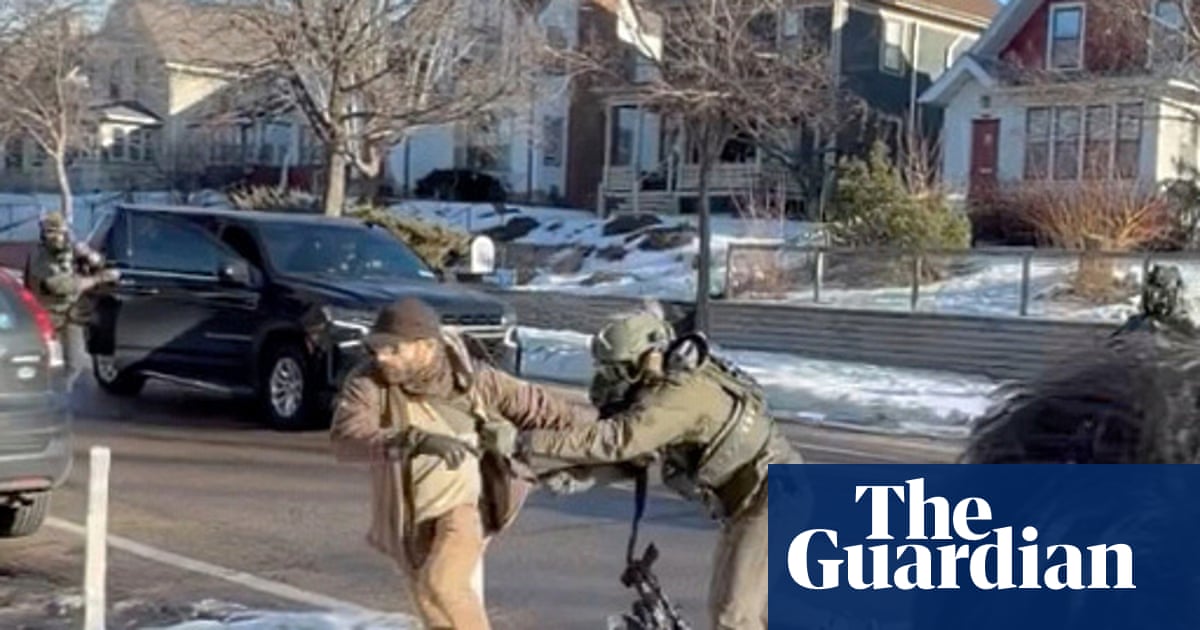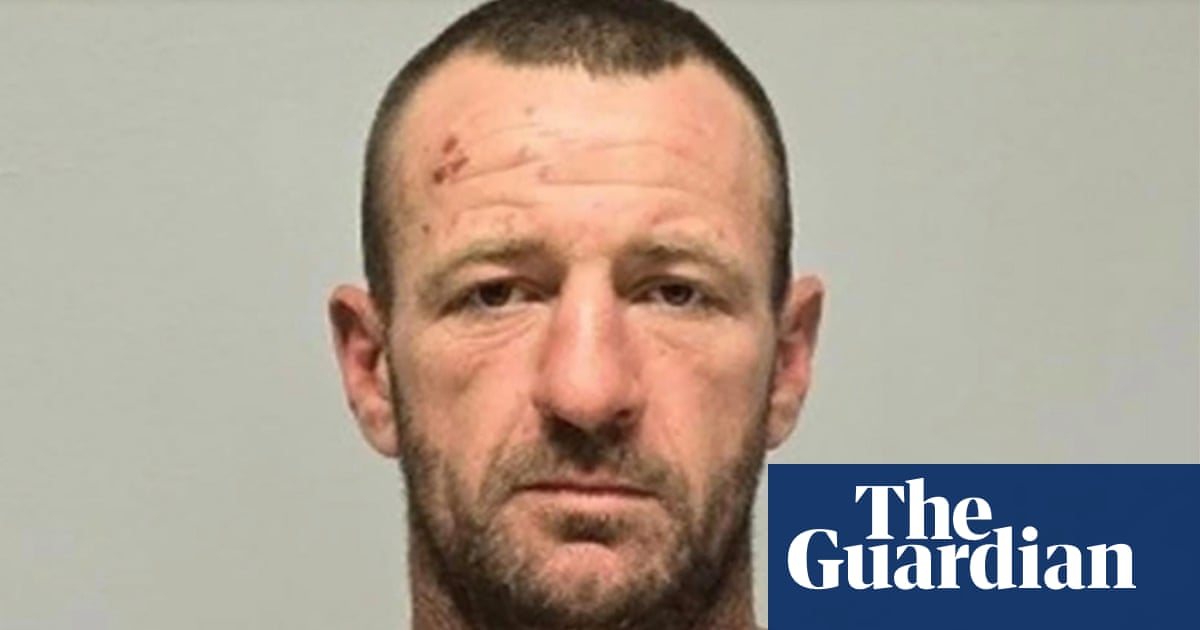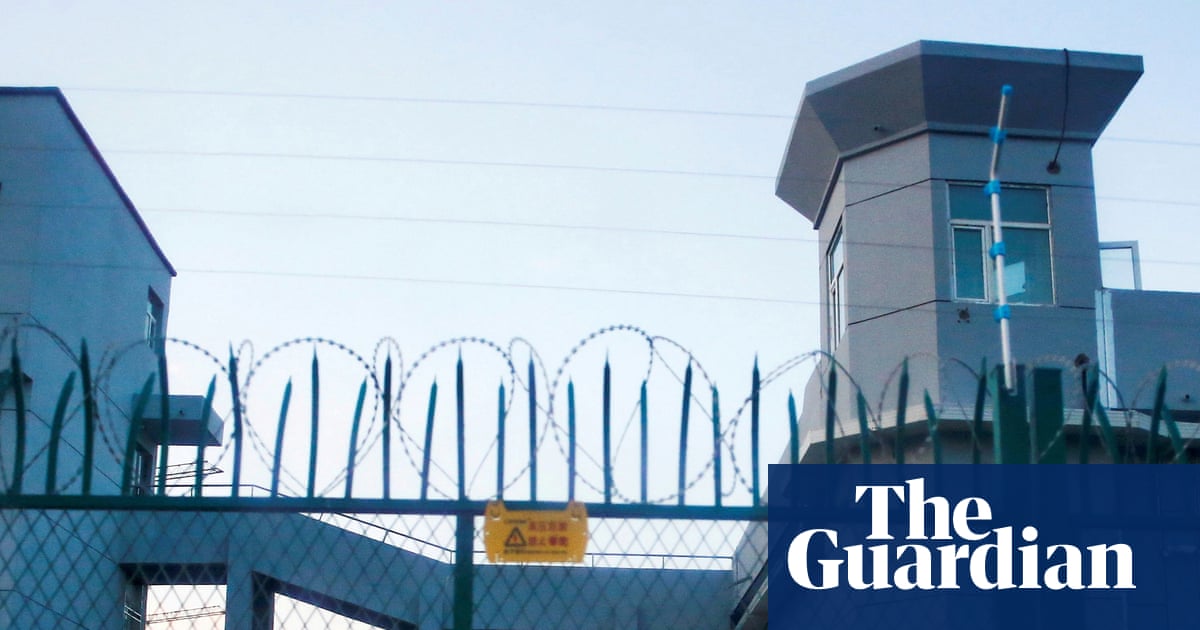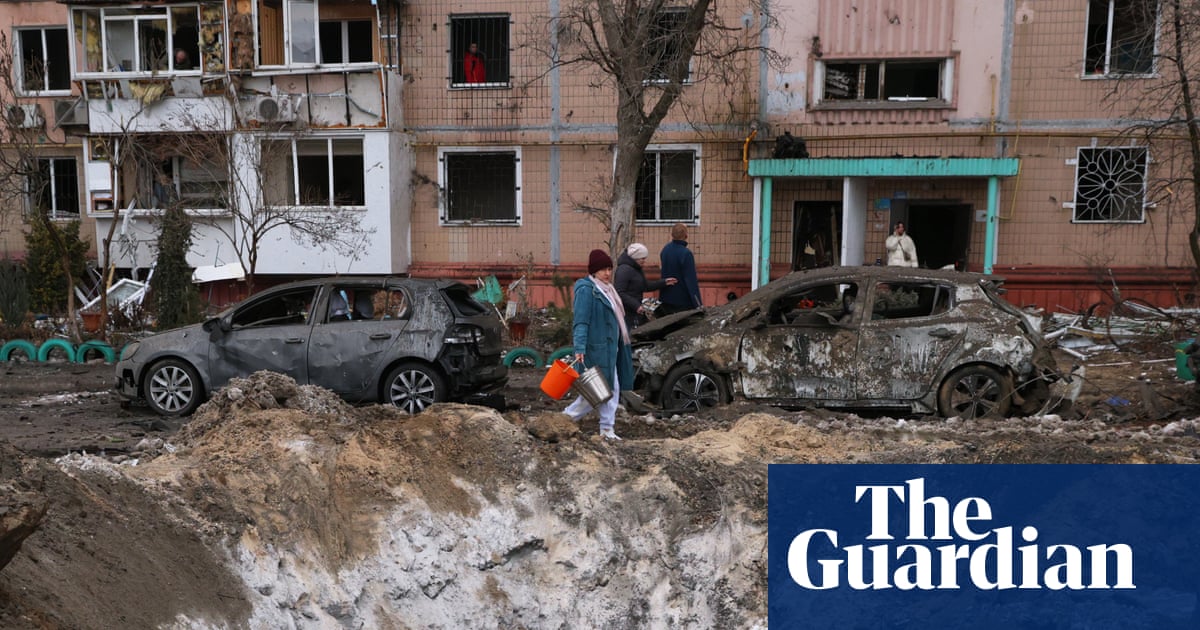When Clint Curtis was appointed to oversee voting in California’s Shasta county earlier this year, the Florida-based lawyer and election skeptic pledged to “fix” the voting process.
Curtis had never before administered an election and didn’t live in this rural northern California region. But he was well-known to followers of the US election denialism movement, who believe the voting system is not secure and that Donald Trump won the 2020 presidential election. Curtis, a former congressional candidate, described himself as an expert in elections law and had long argued that voting machines could be hacked and that the government could manipulate the results of elections.
The ultra-conservative majority on Shasta county’s board of supervisors was hopeful he could overhaul their elections and set an example for the rest of the US.
Now, that vision is being put to the test.
On 4 November, California voters will decide on a high-stakes redistricting proposal in the first election Curtis is tasked with administering.
The special election is one with particular national importance: the ballot measure proposes to suspend the work of California’s independent redistricting commission and allow the legislature to redraw congressional districts to carve out five additional Democratic seats in the US House of Representatives. The effort is a direct attempt to neutralize Texas’s partisan gerrymander, which, engineered at Trump’s behest, created several new safe Republican districts.
Curtis says he’s overseeing the most transparent election in county history, with a livestream of ballot processing and a new area set aside for observers.
“We’re showing people everything, which means they actually have no reason to mistrust it, because they can watch it with their own eyes,” he said.
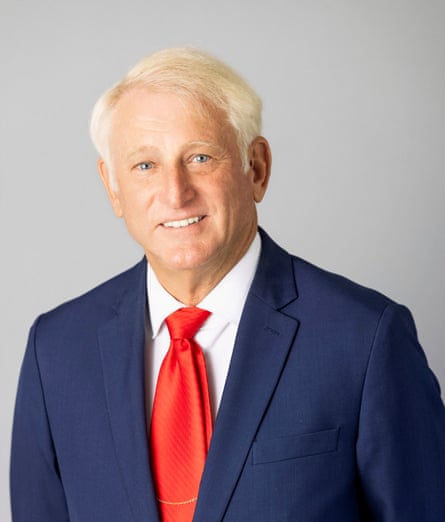
Critics say Curtis’s changes have made them distrust an election system they once felt confident in. They’re alarmed by a statement from the California secretary of state’s office that Curtis hadn’t worked with the department on his plans for the election as he had said. The county’s board of supervisors, which appointed Curtis, threatened to censure him after he stopped sharing press releases with a well-known local media outlet.
They’ve raised concerns about a reduction in drop boxes all well as about several temporary staff members Curtis has hired, many of whom have been outspoken critics of the elections office and its workers, and one who even unsuccessfully sued the county after she lost a local race last year.
“How is this going to increase trust in the community?” asked resident Dawn Duckett, who previously served on a county elections commission. “You [had] this vocal minority of people that [had] concerns. Now you’ve got everybody else now concerned about elections. The whole county is in a state of chaos and turmoil.”
Shasta, a county of 180,000 people where Republicans outnumber Democrats more than two to one, has been attracting national attention for its far-right politics and thriving election-denier movement for years.
In the wake of the 2020 election, a group of local activists convinced of widespread voter fraud waged a years-long campaign against former election officials and staff – one that resulted in many of them leaving the office.
The former registrar of voters, Cathy Darling Allen, in 2022 told a US Senate committee that activists had weaponized election observation activities; that she and staff faced interference and bullying from residents who accused them of election fraud; and that record numbers of poll workers didn’t show up for work. Tensions continued to heighten and that same year, local “election integrity” activists, unaffiliated with the elections office, visited the homes of some voters while wearing gear labeled “official voter taskforce”, which Allen said at the time could amount to voter intimidation.
Allen was one of a few county election officials with a national profile, said Mark Lindeman, the policy and strategy director of the non-profit Verified Voting, with a reputation for competence, knowledge of election procedure and an openness to policy conversations. But the attacks on her and the office were relentless.
The activists found support from at least part of the county leadership, with some members of the board of supervisors not shy about their desire to affect change nationally by dramatically remaking voting in Shasta county. Their efforts have drawn interest from people such as MyPillow founder Mike Lindell, who has for years pushed misinformation about the integrity of voting machines. Some have claimed, without evidence and despite their own successful elections, that voting in the county has been manipulated for years.
In 2023, Shasta’s governing body cut ties with Dominion Voting Systems, the voting machine company at the center of baseless conspiracy theories about election fraud, without consulting the elections office. The board of supervisors sought to implement a hand-count system that experts warned would be costly and far less accurate before the state thwarted their plans. They established an ill-fated elections commission that made recommendations, such as hand-counting ballots, that would have violated state law.
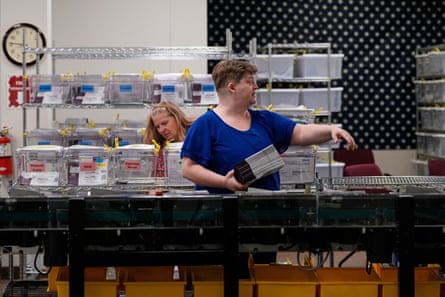
When health issues forced Allen to retire with more than two years left in her term, the board opted to appoint a former prosecutor, Tom Toller, to the role rather than Allen’s deputy, Joanna Francescut, who had more than 16 years’ experience.
He became a vocal defender of the office, stating that he never saw evidence of fraud and that the workers were talented and dedicated. But the campaign against the office continued. Laura Hobbs, a failed supervisor candidate, sued the office, claiming that an error in the placement of her name on the ballot cost her the election. A judge ultimately dismissed the lawsuit, citing a “profound” lack of evidence.
Toller also resigned owing to health issues and endorsed Francescut, but earlier this year the board moved to appoint Curtis rather than the assistant elections clerk and registrar of voters. During a public interview, Curtis highlighted his appearances on the shows of Michael Flynn and Steve Bannon and his work with Mike Lindell, and said he had decades of experience in elections law. He had spent years advocating for hand-counting votes, and arguing that elections were not secure.
He told the board that restoring trust in elections was personal to him, repeating an account he has shared countless times over the years – that as a computer programmer he once developed a software that could change votes. “I broke it. I better fix it,” he said.
In voting to hire Curtis, the supervisor Chris Kelstrom said his appointment could “change voting not only in Shasta county but possibly the whole state and possibly the whole nation”.
Curtis quickly fired Francescut, and moved to start reshaping Shasta elections.
In his new role, Curtis installed additional cameras in the Shasta county elections office to capture ballot processing, removed a gate at the front and significantly reduced the number of ballot drop boxes. He hired Brent Turner, a San Francisco Bay Area-based attorney and elections reform activist who served on the board of the California Association of Voting Officials, as his deputy.
“This was a very contentious place. They were fighting with the public. They were locking them behind these basically spiked walls. They locked them up. Couldn’t let [observers] see anything,” he said of the facility. (As election workers faced growing hostility from observers, the former registrar of voters, Allen, in 2023 had tall metal fencing installed in the office.)
Curtis and Turner provided a tour of the office to the Guardian. The mood inside was jubilant as longtime prominent critics of the department processed ballots in the weeks before the election. State law prevents the county from hand-counting, and Curtis said his focus was on taking additional security measures.
But cameras, Lindeman noted, have done little to move people who are obsessed with transparency and believe something sinister is happening.
“We always see room to do things even better, but the idea that someone can just wave a wand in the great beyond and make the results something different is not factual,” he said. “And it does a real disservice to Americans to attempt to mislead them in that way.”
In Curtis’s view, the office was meeting its goals in establishing an election that everyone can trust. “I’ve looked at a million elections. This is the first [that] I don’t have to sue people so that’s good,” he said. “From a lawyer’s perspective, we’re very solid.”
But Curtis himself has already faced the threat of a lawsuit, accusing him of targeting a local media outlet, Shasta Scout, because of coverage he didn’t like.
The outlet had published a story revealing that the secretary of state’s office said it had not approved Curtis’s plans for the election, contradicting his claims, said Annelise Pierce, the editor and founder of Shasta Scout. Turner, Curtis’s deputy, told Pierce that she was coming close to “meddling” in elections and might be engaging in election interference, Pierce said.
Curtis soon excluded Shasta Scout from receiving press releases, telling the non-profit that his office only “notifies potential media outlets that appear legitimate”. The First Amendment Coalition, a non-profit advocacy group, warned Curtis that excluding Shasta Scout was a violation of the first amendment and made the county vulnerable to a lawsuit.
Less than a week later, the board of supervisors voted unanimously to condemn Curtis’s actions and said it would censure him if it happened again.
“The board’s vote was a real surprise to our community, because we’ve seen this board sort of play a little fast and loose with first amendment rights over the past year,” Pierce said. “And we’ve reported on that. But in this case, they really strongly supported access, and I think that’s a win for the community.”
The elections office moved to publish all its press releases online in the aftermath of the incident. Turner said Shasta Scout had received “bad information” and was speaking to the wrong people in the secretary of state’s office.
“Those people were giving information which was not correct, because we have been in constant conversation with the secretary of state since I’ve been here,” Turner said. (The office said that it had not approved Curtis’s plans, telling Shasta Scout: “We have not seen, nor have been provided, with any such plans.”)
For his part, Curtis said the board received only one side of the story and he had reported Shasta Scout to the IRS and US Department of Justice for what he described as a questionable non-profit status. Pierce said the outlet, one of more than 500 associated with the Institute for Nonprofit News, was operating legally and its filings were up to date. She said Curtis told her that he viewed Shasta Scout as a partisan outlet, but that he declined to provide her with examples of reporting he took issue with.
“We’re a non-profit news organization that believes in non-partisan reporting. We don’t take a stance on things like Prop 50 or who should be elected to office,” she said. “We respect our readers. We just try to provide them with the information that will help them to make those decisions.”
At a meeting of the board of supervisors in late October, several residents said Curtis’s attack on the outlet had them on edge. So did recent changes and Curtis’s decision to hire some of the same local activists who had campaigned against the elections office and its staff for years. Among the new hires was Hobbs, the failed supervisor candidate, who filed another lawsuit against the office earlier this year.
“It’s an extreme concern to me to have many election deniers basically have total access to the ballots and to the elections office,” said Steven Kohn, a local business owner who has frequently spoken to the board in support of the office. He said that he believed Shasta county has long had fair elections and that he was no longer confident in the office.
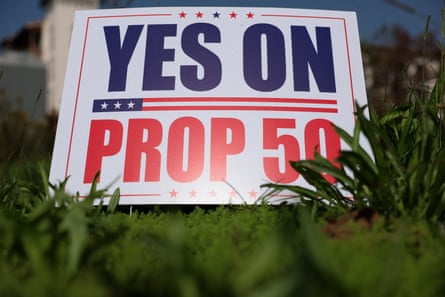
Curtis said he has encouraged people of all political backgrounds to apply for jobs within the office, and that some concerned residents “just want to whine”. Turner was quick to clarify Curtis’s comments.
“I think they’re rightfully nervous, because there have been issues with the systems, and people get nervous about change, but these are upgrades, security upgrades that, by the use of transparency, it shores up the system and you have to recognize that systems always can be upgraded,” he said.
Bringing together critics with the office staff they used to criticize has served as a “psychological integration”, Turner said, adding that morale is high. The office has been in “consistent and ongoing” conversations with the state about the changes, Turner said, and he hopes it can serve as an example to other counties. The California secretary of state’s office said in a statement to the Guardian this week that staff visited Shasta to observe the county’s new processes, but that it had not approved any proposed plans.
The saga in Shasta county stands apart from other places, said Lindeman of Verified Voting, describing Curtis as a contender for the “most clearly unqualified” elections official in the country.
Lindeman expressed concern about recent comments from Curtis that logic and accuracy testing, which ensures voting equipment is fully functional, is a “waste of time”. “That’s like saying that umbrellas are a waste of time because a brick might fall on your head,” Lindeman said. “Good logic and accuracy testing is the first line of defense to help protect voters’ votes.”
But Lindeman was rooting for the county, saying: “I will be hoping that Clint Curtis manages to lead a successful election for the people of Shasta county, who certainly deserve it.”
Curtis has already announced his plans to run for office when his term is up, writing on his campaign website that “if politicians can gain this seat back, America will never return to real elections again”. Francescut too is running with the endorsement of other elections officials, retired sheriffs and her predecessor Toller, who wrote that her “professionalism and impartiality transformed this former election skeptic”.

 2 months ago
54
2 months ago
54
